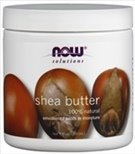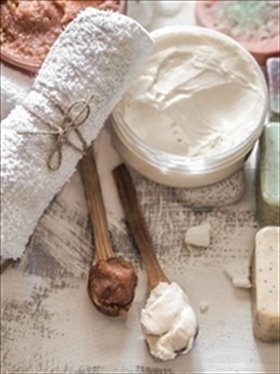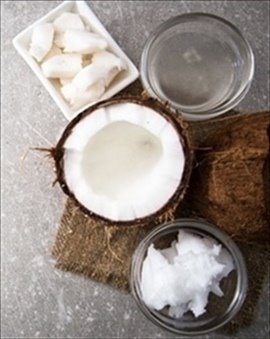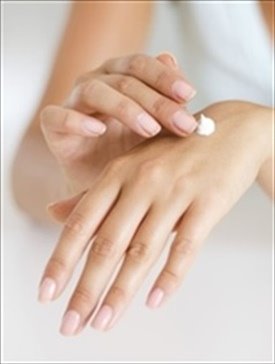The Best Natural Moisturizers for Healthy Winter Skin
.jpg)
The winter season comes equipped with low temperatures, crisp air, and pumping heaters. All of these factors are harsh on skin and can cause it to dry out. In addition to cosmetic side effects—like fine lines and wrinkles—dry, dehydrated skin is vulnerable to harmful irritants and germs.
Luckily, we can protect our skin by keeping it hydrated and locking in moisture. Skin absorbs everything that's put onto it, so it's important to coat it with organic, nourishing ingredients. Here are five all-natural skincare products for healthy, hydrated, radiant skin all season long.

Shea Butter
Shea Butter is a pure, natural super food that offers a ton of benefits for skin and overall health. It's rich in fatty acids and vitamins that offer moisturizing and healing capabilities. Shea butter can reduce the effects of aging by boosting collagen and repairing damaged skin. It's a popular pick because it quickly absorbs into skin and doesn't leave it feeling sticky or oily.

How to Use It
• Add a layer of it to your skin before spending time outdoors in low, crisp temperatures to help prevent windburn and dehydration.
• Dry, cracked feet are especially common during the colder months. You can keep them soft and callous-free by adding shea butter to them every night. Putting on a pair of comfy socks after the application will help seal in the moisture.
• For those pesky colds and sniffly noses, adding shea butter to the inside of the nostrils can help heal and protect the skin from the wear and tear of needing to constantly wipe or blow your nose. Plus, it's believed to improve respiration by decreasing congestion!
Olive Oil
Olive oil is super moisturizing, has antioxidant properties, and is rich in vitamins, including A, D, K, and E. Thanks to its antioxidant properties, olive oil helps fight bacteria – including the bacteria that causes acne. Olive oil also helps seal in moisture, which is important in cold, dry environments that often dehydrate skin.
.jpg)
How to Use It
• Add a few drops of olive oil to your lotion before applying it. Pro tip: while applying olive oil-infused lotion, stay in a steamy post-shower bathroom to keep your skin as hydrated as possible. This will keep your skin moisturized, nourished, and glowing all day long!
• If cold weather makes your skin dry, itchy, and cracked, moisturizing your whole body with olive oil can help alleviate this. Adding a few drops of roman chamomile essential oil to the olive oil can help relieve itchy skin as well.
• You can use olive oil to help prevent wrinkles due to its antioxidant super powers! Apply it to your skin 1-2 times per week to keep it soft, smooth, and wrinkle-free.
Coconut Oil
Full of healthy, saturated fatty acids and vitamin E, coconut oil has been shown to improve and soothe skin, and protect it from environmental damage. Its anti-inflammatory and anti-bacterial properties help keep pores dirt-free, clear away dead skin cells, and draw out impurities from skin. This gives skin a healthier complexion. Coconut oil is great to have on-hand because it absorbs quickly, leaving skin silky smooth.

How to Use It
• Each morning and night, after washing and gently drying your face, put some coconut oil on your fingertip (a little bit goes a long way), then rub it all over your face.
• It works wonders for the whole body as a moisturizer. You can use it on your hands, feet, and even as a massage oil.
• Coconut oil is a cleanser and moisturizer all in one! It works as a fantastic makeup remover. Just put a little bit of coconut oil onto a cotton ball and gently wipe it over your eyes and the rest of your face to remove makeup. This is a great choice during the colder seasons because it leaves skin hydrated and soft.

Grapeseed Oil
Grapeseed oil has high levels of omega-6 fatty acids and vitamins C and E, which protect skin from damaging environmental factors. It can also reduce inflammation, and is often used to help treat acne. Grapeseed oil also helps support our immune systems, which is key in the fall and winter when we are more prone to getting sick. It absorbs quickly into skin, is lighter than other oils, doesn't clog pores, and doesn't leave skin feeling oily - making a great choice for all skin types!
How to Use It
• To moisturize and heal skin overnight, massage several drops of grapeseed oil onto clean skin before going to bed at night.
• The vitamin C in grapeseed oil can makes skin glow and reduces marks, like "crow's feet". Apply it to the areas of your skin that are more dried out and could use some rejuvenation.

Jojoba Oil
Jojoba oil is structurally similar to the oily secretion that skin glands produce for moisturization. This makes it a great oil to use during the dry, cold seasons when our skin has a hard time staying hydrated. Because it's a waxy substance, jojoba oil seals in moisture and creates a barrier between skin and harmful exterior elements.

How to Use It
• Before venturing out into cold, dry environments, rub a few drops of jojoba oil between your palms and apply it to your face and other areas of exposed skin.
• When your skin is in need of a deep moisturizing treatment, warm up a spoonful of jojoba oil and massage it into freshly washed skin. Leave it on overnight to wake up with silky smooth skin!
• Dry, cracked feet are common during the colder seasons. To relieve this, soak your feet in warm water for 5-10 minutes. After drying them off, rub down hardened areas with a pumice stone, and massage them with jojoba oil. This will lock in moisture and make your skin smooth.
You can find all of these skincare products and MORE at EverydayYoga.com!

